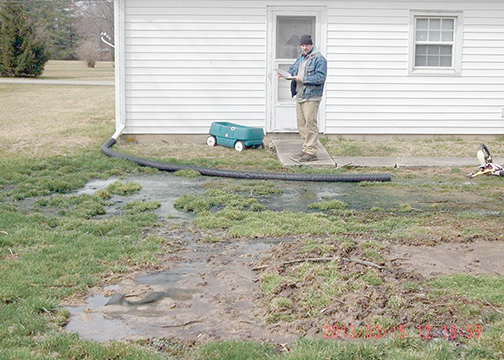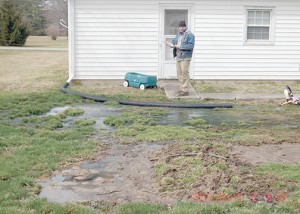

Editor
Julianne Nesbit, health commissioner, gave the Clermont County Commissioners an update on the Clermont County Public Health’s programs during the June 27 commissioner meeting.
For the first time this year, CCPH gave out 75 free bike helmets to kids after receiving a grant. They have 25 left to give, many of which are for older kids that do not want to be seen wearing a helmet. Nesbit hopes they will be able to do the same program again next year.
CCPH is also starting to push the tobacco cessation program, as tobacco is still the leading preventable cause of death in the United States.
“All tobacco use is one of our biggest concerns. It’s one of our main issues in our community health improvement plan that we’re working on,” Nesbit said.
She also told commissioners that quitting smoking before age 40 reduces a smoker’s risk of dying from a smoking related disease by about 90 percent. However, that doesn’t mean smokers older than 40 shouldn’t quit.
“At any age and at any time it’s a good thing,” Nesbit said.
CCPH plans to work with county employees starting as soon as this fall to provide tobacco cessation classes, Nesbit said.
Another program that the CCPH is taking on is Ohio Buckles Buckeyes, a program to provide car seats to low income residents. The program has been in the county before but was typically run out of fire departments.
Two members of the CCPH staff went to a five day training to be certified to give out the seats and teach residents how to properly put them in the car, which varies from car to car.
“The bigger issue is the different car manufacturers all have different directions on how to install a car seat,” Nesbit said.
The car seats the state provides at no cost to CCPH range from seats that fit infants up to five pounds to seats that fit an 80 pound child. There are some seats that are convertible so caregivers can use the same seat as the child grows and there are booster seats in case there is a child that just needs a booster seat, Nesbit said.
In addition, because some of the staff is certified, they can check and make sure that a car seat is installed correctly, even if the caregiver did not receive the seat from CCPH, if the office isn’t too busy, Nesbit said.
Also new this year, CCPH brought medical gas permits and inspections to the county, whereas in the past the organization contracted with Hamilton County Public Health. CCPH did not do the inspections before because there wasn’t enough staff and the organization has to pay insurance to do it.
“We decided to bring that back into our shop which is great for economic development in the county,” Nesbit said.
Two staff members trained for months and CCPH began providing local service on June 1. Any business that uses medical gas needs to have the system inspected.
In addition, CCPH started providing ServSafe training again after stopping a few years ago because the organization was short staffed. Now it offers a course every other month, Nesbit said.
CCPH is continuing to do increased training on ebola because it can come back at any time. The staff is also putting out information on harmful algal blooms that can occur in lakes and rivers.
While Zika is not being directly transmitted into the United States, it is still a concern. At this point, the only cases in the U.S., including one in Ohio, have been from travelers being infected and bringing it back, Nesbit said.
The type of mosquito that transmit Zika acts as an intermediary between a person that is infected with Zika that the mosquito bites and the person that the mosquito then bites and infects with Zika. There are groups testing the area for the mosquito that carries Zika.
CCPH has worked with physicians in the area and put out recommendations for people trying to conceive and for the general public, including to not leave standing water, which attracts both the mosquitos that carry Zika and those that carry West Nile virus to lay eggs.
CCPH also works with Prevent Blindness of Ohio to help residents by get eye exams and glasses, if needed. Almost 200,000 Ohioans are blind or visually impaired, Nesbit said.
If residents can not afford an exam or glasses, CCPH can help residents get them free. Find out more by calling CCPH.
Another program CCPH runs to help the less fortunate is the Septic Rehab Program, which has helped 173 homes since 1996 and financed $1.3 million in repairs since 2006. This year, $450,000 has been budgeted for the program, which is more than normal because there is more funding than normal, Nesbit said.
The program is funded by Community Development Block Grant Funds and Environmental Protection Agency Water Pollution Control Loan Funds. CCPH plans to assist 25 homes this year, which are chosen based on the severity of the problem, how many times the homeowner has applied for assistance and the poverty level of the owner.
This year CCPH has had a hard time finding contractors because many are booked for the summer already and contractors can be selective when picking jobs right now because there are so many available. The jobs in this program are typically difficult, Nesbit said.
“Going out and installing a septic system on a vacant piece of property when it’s brand new construction is 100 times easier than going into one of these properties where three quarters of the yard is filled with sewage,” Nesbit said.
CCPH does 6-8,000 inspections every year and sends information on the program out to people whose systems are failing. The Septic Rehab Committee approves the work plan and the list of ranked properties.
It is critical to repair septic systems because when they fail raw sewage comes up into yards, which is a public health concern especially because sometimes children play in areas where systems are failing, Nesbit said.
She also spoke about the vaccines that CCPH can give, such as vaccines for people traveling overseas. She has found that a common misconception is CCPH only works with Medicaid, but the organization actually takes all major insurance.
The organization also vaccinates animals. CCPH offers low cost rabies vaccines, usually in conjunction with a local vet. Nesbit reminded meeting attendees that vaccinating is important, as CCPH usually investigates 300 animal bites a year.
